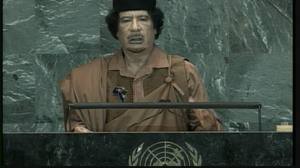Heads of state aren’t to be ignored like the overzealous advocates for Jesus with megaphones in Times Square. When these street preachers announce the end times are nigh, we’re pretty safe in going about our regularly scheduled business. Holding high office however, means announcing forthcoming “house by house, village by village” “cleansing” has the weight of state power. Why should we not take a head of state at their word when they make such speeches? Particularly when they already have a dubious human rights record – senior regime officials promising “rivers of blood” does not inspire confidence. What more does the international community need to prompt decisive action, is the UN Security Council to wait for monogrammed invitations to watch the systematic slaughter?

The Colonel’s Chamberlain has been commanded by
His Excellency to invite
the United Nations Security Council
to witness crimes against humanity in commemoration of
His Excellencies’ fourth decade in power.
Thinking through goals, outcomes, and possible exits is all to the good. But it is possible to overstate the amount of control we have over these by mere planning, that thinking through scenarios gives a false sense of confidence in our abilities. Those warning of uncertainty are correct as far as that point goes as attaching probabilities does not add to the certainty. These are estimations offered by people with experience and expertise, yes, but not Delphic pronouncements on the future. We gain a sense of the possibilities, and a possibly false, sense of control over these possibilities.
Confronted with the challenge of those opposed to military intervention in Libya, do you have reservations? Do you have doubts? Do you have uncertainties about an endeavor to use violence with a foreseeable consequence of both civilian and coalition deaths? The critic in me must answer: yes, yes, and yes. The campaigner in me must answer no, no, and no.
Do you have doubts? First the yeses of the critic. Military action means innocents will die, this is not a fact to be overlooked by anyone. Discussions of war must confront the horror of this fact. Sending the armed forces to fight, die, and kill, is not to be relished, celebrated, or approached with glee. War critics are entitled to the point that wars often mean old men sending young men into battle, and in an all volunteer armed services a small proportion of the population must bear a disproportionate share of the burden. In undergrad a professor put it starkly, would Iraq mean something different if every man in this room knew after graduation he faced the draft? The other what if questions are also wholly legitimate, what happens if a pilot is captured, what if no-fly, no-drive, and no-sail zones are insufficient, what about a stalemate, what happens if this drags on for months, years, or longer?
Even more forceful challenges offered by Freddie, they’re bringing back all the classics,
I can tell you the reasons for not intervening in any of these, of course, and for getting out of Iraq and Afghanistan. Because democracy through military occupation is an absurd contradiction in terms. Because we cannot touch the world outside our borders without killing innocent people. Because we are not the world’s authority figure. Because goddamn it, we are not nearly strong or smart or capable or moral or competent enough to succeed in such attempts, as has been proven time and time again.
As critic, I can doubt, and I can do so publicly.

"President Lyndon B. Johnson listens to tape sent by Captain Charles Robb from Vietnam, 07/31/1968" (Jack E. Kightlinger/LBJ Library)
As campaigner I must highlight to the justice of the cause, the fundamental immorality of standing by while atrocities are committed. In this guise not only do I possess certainty, I wield it as a weapon. I become righteousness personified, as insistent as the street preacher with the megaphone. Thus opponents are targeted with the nastiest ad hominem: unserious, un-American, cowardly, heartless, the abusive rhetoric is all too easy in the midst of campaigning. (Some imagine their righteousness gives them license, for the most part I disagree, and (hopefully) avoid this scorched earth line.) As campaigner, the past must be another country, past inadequacies, past failures, past deals with the devil must be set aside – I must have perpetually clean hands to campaign. As campaigner I am in the moment, the now-ness of the atrocities takes precedence over all else. (Earlier I ridiculed libertarians for seeing sunrise this morning as heralding the beginning of the world anew – I’m willing to own up to the contradiction here, as campaigner I must see the world as New and Now.)
Marc Lynch’s analysis and posts exemplify the duel between analyst and campaigner, Lynch as analyst in The U.N.’s High Stakes Gamble in Libya and Lynch as campaigner in Intervening in the Libyan tragedy. While Lynch has concluded on his reservations, I come down on the side continuing to support humanitarian intervention and the responsibility to protect in general, and intervention in Libya in particular (My guest post over at LOoG here).
If you have the seven or eight minutes, two scenes I’ve been thinking about lately from Doubt,
I have my certainty!
I have doubts.